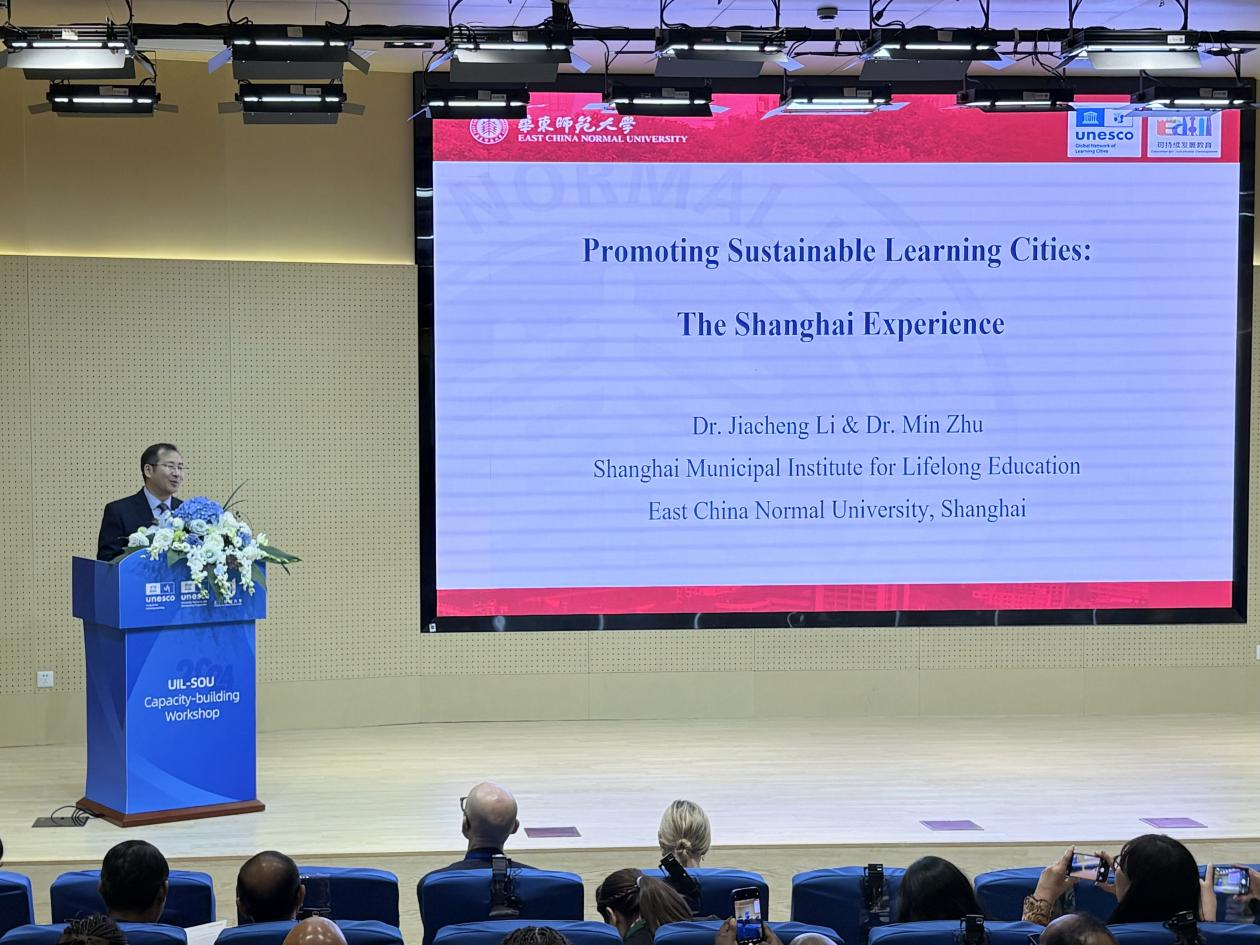East side of 7th Floor, No. 3663, North
Zhongshan Road, Shanghai, China, 200062
Tel: +86 21 6223 2322
www.smile.ecnu.edu.cn
On the morning of October 21, the Capacity Building Workshop “Empowering Cities to Become Key Players in Promoting Lifelong Learning” organized by the UNESCO Institute for Lifelong Learning (UIL)was held in Shanghai Open University. Professor Li Jiacheng, executive vice president of the Shanghai Municipal Institute for Lifelong Learning (SMILE), was invited to give a presentation on “Promoting Sustainable Learning Cities: The Shanghai Experience” after the opening ceremony.

ProfessorLi Jiacheng gave the first report for the workshop
President Li introduced the presentation with four questions: What is unique about Shanghai in building a learning city? How has Shanghai developed into a learning city? How has Shanghai interacted and cooperated with other cities? How does Shanghai support or influence learning city policies and practices in China?
President Li began by discussing Shanghai's unique strengths in building a learning city, which he summarized as its mega-population, the influence of Chinese learning culture in the processofurbanization, the needs of Shanghai's economic and social development, its position in China, the international context and its sensitivity to global issues.
Whentalking about how Shanghai developed into a learning city, President Li reviewed that since the goal of building a learning city was proposedin 1999, Shanghai had introduced a series of policies and local legislation. These measures laid the groundwork for the implementation of planning and funding. He mentioned that the implementation of the Shanghai Lifelong Education Promotion Regulations had further promoted the development of Shanghai as a learning city. In addition, organizational guarantee at all levels has provided strong support for the building of the learning city and ensured the orderly progress of the work. In particular, President Li pointed out that Shanghai had established a multi-level learning network of open universities, community schools, and schools for the elderly and had realized the organic integration of different forms of learning through the “15-minute learning circle”. In terms of digital transformation, Shanghai has actively responded to the development of science and technology to help the elderly bridge the digital divide, promoted the construction of the Elderly Education MOOCAlliance and carried out many microlecture projects. He emphasized that with the deepening of the research work, Shanghai continued to enhance the promotion of lifelong learning programs through continuous scientific research and evaluation.
When talking about Shanghai's interaction and cooperation with other cities, President Li said that the policy ofYangtze River Delta integration had promoted collaboration and exchange among cities. He pointed out that the Shanghai Forum on Lifelong Education had provided a platform for academic interactions and deepened Shanghai's ties with cities such as Beijing, Nanjing, Hangzhou, Chengdu and Wuhan. In addition, Shanghai's active participation in national policy research has led to a natural interactionin its cooperation with Beijingand other cities .
President Li concluded by mentioning that Shanghai hadplayed an important role in supporting and influencing national learning city policies. He pointed out that with the constant updating of China's policies, Shanghai had accumulated a wealth of experience in exploring and innovating, providing the Ministry of Education with a valuable basis for research and attracting the attention and participation of many experts.
After President Li's insightful report, the delegates carried out active exchanges and discussions at the event. Representatives from South Africa, Mongolia, Cambodia, Egypt, and other places had a lively discussion with President Li on issues such as the international and national standards of lifelong education, the substantial changes that have taken place in Shanghai through the building of a sustainable learning city, the cooperationapproaches among multi-stakeholders, and the challenges facing the vigorous development of lifelong education in Shanghai. President Li seriously responded to the concerns of all parties, shared Shanghai's concrete experience in promoting the development of lifelong education, and expressed his expectations for the future prospects of cooperation with the city representatives.
President Li's speech provided participants with profound insights, demonstrated Shanghai's leading position in the building of learning cities, and inspired more cities to learn from Shanghai's successful experience and jointly promote the development of global learning cities.

Group photo of the workshop
Provided by: Shi Keyuan
Reviewed By: Zou Wen, Li Jiacheng